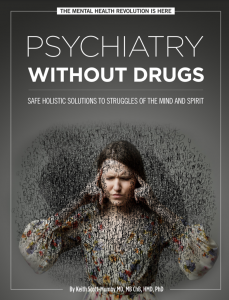For years I’ve been trying to tell my crazy psychiatrist colleagues that most mental illness is a myth. It’s not about broken minds; it’s about the adverse effects of physical causes on mental function.
Every woman (and most men) know that around your period, you change mood. It’s called premenstrual tension (PMT) or premenstrual syndrome (PMS). Imbalance and changes in hormone levels can drive someone crazy. But do psychiatrists measure hormone levels before prescribing meds? No. Or at least 99% don’t (there are some good psychiatrists out there, including my good friend prof. Greg Brown MD, here at the University of Nevada, Las Vegas).
Hormone changes can be so extreme that a woman becomes murderous. The notorious 19th-century case of Lizzie Borden is an example. She took an axe and murdered her mother and father. But she was not hanged because her premenstrual symptoms were very extreme.

In my career, I saw countless “mentally ill” cases who were not. They simply suffered with food allergies. The man who opened my eyes to food allergies and psychiatric problems was a British psychiatrist called Richard Mackarness. He wrote a book called Not All In The Mind, because he was tired of seeing sad and dispirited patients, who doctors couldn’t help, being told their problem was “all in the mind”.
It need not be even as extreme as food allergy; just the difference between eating well and eating junk. Looking at what the people around me eat here in America, I think I’d be so depressed and sluggish, I’d be ready to slash my wrists within a week!
Here’s a fascinating study showing simple and easy reversal of depression by just eating better. In fact even a brief period of healthy eating may provide longer-term improvements in mood.
Young adults with depression whose diet is usually unhealthy showed significantly fewer symptoms of depression after eating a healthy diet for three weeks, according to a study published October 9, 2019 in the Public Library of Science (PLOS) One by Heather Francis from Macquarie University, Australia, and colleagues.
While much research has shown that eating a healthy diet rich in fruit, vegetables, fish, and lean meat is associated with a reduced risk of depression, there have been very few randomized controlled trials directly examining the link between the two, including for young adults, who are establishing health patterns and are also at higher risk for depression.
Francis and colleagues studied 76 university students (17-35 years old) exhibiting moderate-to-high depression symptoms and following a poor diet based on the Australian Guide to Healthy Eating Inclusion criteria.
Participants were eligible if they were aged 17–35, had test scores showing moderate or higher depression symptoms and a higher score on the Dietary Fat and Sugar Screener (DFS), suggesting a poor diet that does not comply with the Australian Guide to Healthy Eating (high in processed foods, sugar, and saturated fats).
If receiving antidepressant medication or psychological therapy, participants were required to be on the same treatment for at least 2 weeks before study participation.
The researchers randomized participants into a “diet change” group or a “regular diet” group. The diet change group were briefed on diet and instructed to increase intake of vegetables (5 servings per day), fruits (2–3 per day), wholegrain cereals (3 per day), protein (lean meat, poultry, eggs, tofu, legumes; 3 per day), unsweetened dairy (3 per day), fish (3 per week), nuts and seeds (3 tablespoons per day), olive oil (2 tablespoons per day), spices (turmeric and cinnamon; 1 teaspoon most days). Conversely, they were instructed to decrease refined carbohydrate, sugar, fatty or processed meats and soft-drinks.
Each group member also received two subsequent check-ins via phone call.
To assist in complying with diet recommendations, participants in the diet change group each received a small hamper of food items including olive oil, natural nut butter, nuts and seeds (walnuts, almonds, pepitas, sunflower seeds) and spices (cinnamon, turmeric). They were told to keep their shopping receipts in order to receive a $60 gift card as reimbursement for study foods.
The regular diet group did not get any diet instructions and were simply asked to return after the three weeks were up. Before and after the intervention, the researchers assessed participants’ scores for depression, anxiety and overall mood, and their performance on several learning and reasoning tasks.
At the end of the three weeks, the diet change group had successfully maintained a healthy diet and showed significant improvement in mood, with depression scores shifting into the normal range. The regular diet group’s depression scores remained stable in the moderate-to-high range. The diet change group also showed significantly lower anxiety scores than the regular diet group, though other measures were not significantly different between the groups.
The authors followed up with 33 of the participants after three months. In this small sample, they found that while only 21 percent of these participants fully maintained the healthy diet, those that did maintained their improvements in mood.
This study is limited in that the no change group received no intervention – ideally, this group would have received alternative diet instructions, check-ins and monetary contributions to parallel the diet change group. These findings are also derived from a small, specific population of university students. However, they provide preliminary evidence that relatively small, simple diet adjustments can directly improve depression symptoms, and that these effects can last up to three months.
The authors add: “Modifying diet to reduce processed food intake and increase consumption of fruit, vegetables, fish and olive oil improved depression symptoms in young adults. These findings add to a growing literature showing a modest change to diet is a useful adjunct therapy to reduce symptoms of depression.”
Well, it’s a bigger issue than that. It’s more than an “adjunct” therapy. It is THE treatment of choice! Almost ALL mental health symptoms have correctable physical causes, whether it’s dietary, stealth pathogens, heavy metal poisoning, insulin resistance, hormonal imbalances,
And don’t forget stress is, well… stressful. It doesn’t need medication for goodness’ sake! It needs de-stressing. Duh!
If this kind of talk fascinates or inspires you, get yourself a copy of my paradigm-busting manual on the real causes of mental distress and mind malfunction: Psychiatry Without Drugs. It’s a bumper book (422 pages).

Click here for Psychiatry Without Drugs

Prof. Keith Scott-Mumby
The Official Alternative Doctor
Source: A brief diet intervention can reduce symptoms of depression in young adults – A randomised controlled trial. Heather M. Francis ,Richard J. Stevenson, Jaime R. Chambers, Dolly Gupta, Brooklyn Newey, Chai K. Lim. Published: October 9, 2019 https://doi.org/10.1371/journal.pone.0222768
